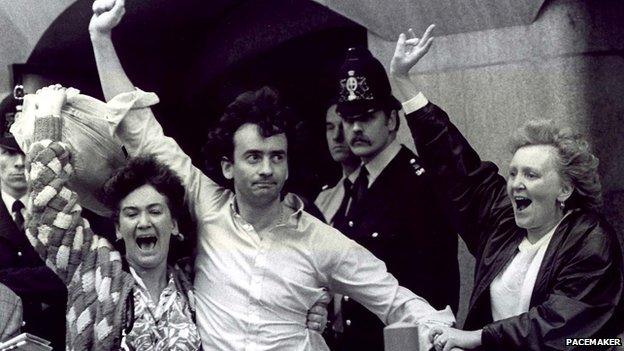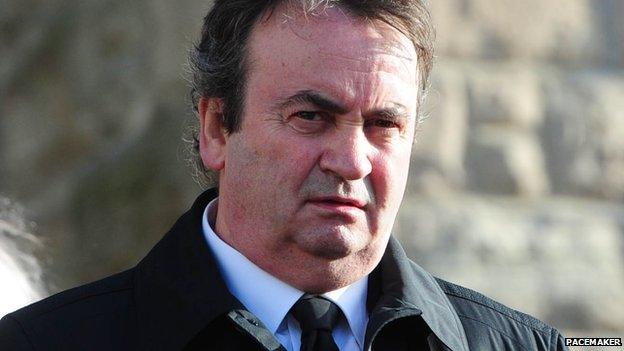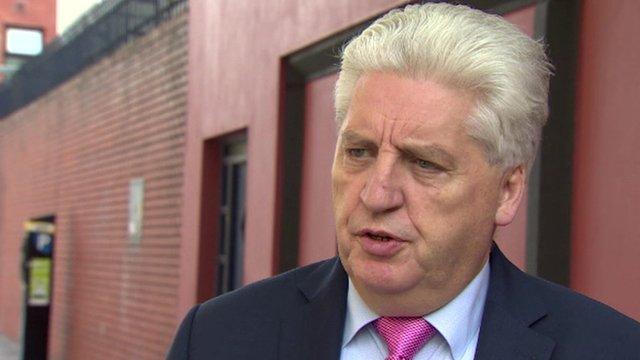Guildford Four's Gerry Conlon dies
- Published

Gerry Conlon, pictured with his sisters after being released at the Old Bailey in 1989
Gerry Conlon, who was wrongly convicted of the 1974 Guildford IRA pub bombing, external, has died aged 60 after an illness.
He was one of the Guildford Four, who spent 15 years in prison before their convictions were quashed in 1989.
Mr Conlon's family said his fight for justice had "forced the world's closed eyes to be opened to injustice".
His case was highlighted in the 1993 Oscar-nominated film In The Name Of The Father, starring Daniel Day-Lewis.
Bombing campaign
The Guildford Four were convicted amid the backdrop of an IRA bombing campaign targeting pubs in England.
High-profile attacks were carried out in Guildford, Woolwich and Birmingham in 1974, external.
Gerry Conlon, Paddy Armstrong, Paul Hill and Carole Richardson were jailed for life in 1975 for an attack on the Horse and Groom pub in Guildford which killed four soldiers and a civilian, as well as injuring scores more.
All those involved vigorously protested their innocence.
The Court of Appeal quashed their sentences in October 1989, amid doubts raised about the police evidence against them.
An investigation into the case by Avon and Somerset Police found serious flaws in the way Surrey Police handled the case - considered to be one of the biggest miscarriages of justice in Britain.
Gerry Conlon: "I've been in prison for 15 years for something I didn't do"
The perpetrators of the Guildford bomb attack have never been brought to justice.
When he emerged from court after his conviction was quashed, Mr Conlon said: "I have been in prison for something I did not do. I am totally innocent."
In 2009, he wrote about the emotional problems he endured as a result of his incarceration, revealing that he had suffered two breakdowns, and attempted suicide. He also developed an addiction to alcohol and drugs.
'Darkest hours'
Mr Conlon died at his home in the Falls Road area of west Belfast after an illness.

Mr Conlon, pictured in 2013 at the funeral of SDLP MP Eddie McGrady
In a statement issued through his lawyer Gareth Peirce, Mr Conlon's family said: "He brought life, love, intelligence, wit and strength to our family through its darkest hours.
"He helped us to survive what we were not meant to survive.
"We recognise that what he achieved by fighting for justice for us had a far, far greater importance - it forced the world's closed eyes to be opened to injustice; it forced unimaginable wickedness to be acknowledged; we believe it changed the course of history.
"We thank him for his life and we thank all his many friends for their love."
The Maguire Seven
After Mr Conlon was jailed for the pub bombing, seven people were arrested because of a family connection to him.
Among them was Mr Conlon's father Giuseppe, who was arrested while travelling to London from Belfast to help his son.
They became known, as the Maguire Seven, external and were convicted and jailed for handling explosives, based on scientific evidence which was later entirely discredited.
SDLP leader Alasdair McDonnell said Mr Conlon "bore no grudges"
Giuseppe Conlon died in prison in 1980.
The sentences given the Maguire Seven were overturned by the Court of Appeal in June 1991.
Annie Maguire, who was one of the Maguire Seven, described Mr Conlon's death as "very sad news".
"I am sad to hear he has died so young, and am sorry for his sisters," she said.
Paul Hill said: "I think he suffered a great deal more than the other individuals involved, myself included, because Gerard could never have release of his father.
"I always said that Gerard's father was continuously imprisoned in Gerard's mind.
"Not only did he feel responsible (for his father's death in prison), but every time he looked at his mother, the late Sarah, I think he seen his father. That was Gerard's problem."
SDLP leader Alasdair McDonnell said Mr Conlon had been a "close friend".
'Miscarriage of justice'
"Gerry had a strong sense of social justice and an uncompromising desire to right the wrongs that had been suffered by others," he said.
"The miscarriage of justice that Gerry, his father and friends suffered was terrible and appalling.
"He was a shining light in the search for truth and a tireless campaigner for justice."
Sinn Féin President Gerry Adams said: "Gerry and his father Giuseppe were two of the most infamous examples of miscarriages of justice by the British political and judicial system."
In 2005, the then Prime Minister Tony Blair issued a public apology, external to the Guildford Four and the Maguire Seven for the miscarriages of justice they had suffered.
- Published21 June 2014
